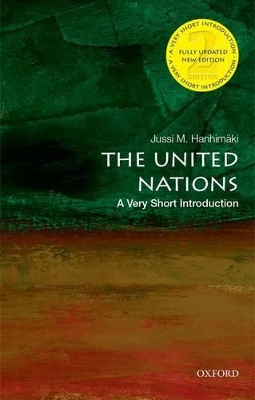Very Short Introductions
2 total works
After a brief history of the United Nations and its predecessor, the League of Nations, the author examines the UN's successes and failures as a guardian of international peace and security, as a promoter of human rights, as a protector of international law, and as an engineer of socio-economic development. Hanhim ki stresses that the UN's greatest problem has been the impossibly wide gap between its ambitions and capabilities. In the area of international security, for instance, the UN has to settle conflicts--be they between or within states--without offending the national sovereignty of its member states, and without being sidelined by strong countries, as happened in the 2003 intervention of Iraq. Hanhim ki also provides a clear accounting of the UN and its various arms and organizations (such as UNESCO and UNICEF), and he offers a critical overview of how effective it has been in the recent crises in Rwanda and the former Yugoslavia, for example--and how likely it is to meet its overall goals in the future.
The United Nations, Hanhim ki concludes, is an indispensable organization that has made the world a better place. But it is also a deeply flawed institution, in need of constant reform.
About the Series:
Oxford's Very Short Introductions series offers concise and original introductions to a wide range of subjects--from Islam to Sociology, Politics to Classics, Literary Theory to History, and Archaeology to the Bible. Not simply a textbook of definitions, each volume in this series provides trenchant and provocative--yet always balanced and complete--discussions of the central issues in a given discipline or field. Every Very Short Introduction gives a readable evolution of the subject in question, demonstrating how the subject has developed and how it has influenced society. Eventually, the series will encompass every major academic discipline, offering all students an accessible and abundant reference library. Whatever the area of study that one deems important or appealing, whatever the topic that fascinates the general reader, the Very Short Introductions series has a handy and affordable guide that will likely prove indispensable.
Council in action and peacekeeping efforts while exploring its most recent successes and failures.
After a brief history of the United Nations and its predecessor, the League of Nations, Hanhimäki examines the UN's successes and failures as a guardian of international peace and security, as a promoter of human rights, as a protector of international law, and as an engineer of socio-economic development. This updated edition highlights what continues to make the UN a complicated organization today, and the ongoing challenges between its ambitions and capabilities. Hanhimäki also
provides a clear account of the UN and its various arms and organizations (such as UNESCO and UNICEF), and offers a critical overview of the UN Security Council's involvement in recent crises in Iran, Afghanistan, Iraq, Ukraine, Libya, and Syria, and how likely it is to meet its overall goals in the future.
Regardless of its obstacles, the UN is likely to survive for the foreseeable future. That alone makes trying to understand the UN in all its manifold - magnificent and frustrating - complexity a worthy task. With this much-needed updated introduction to the UN, Jussi Hanhimäki engages the current debate over the organizations effectiveness as he provides a clear understanding of how it was originally conceived, how it has come to its present form, and how it must confront new challenges in
a rapidly changing world.
ABOUT THE SERIES:
The Very Short Introductions series from Oxford University Press contains hundreds of titles in almost every subject area. These pocket-sized books are the perfect way to get ahead in a new subject quickly. Our expert authors combine facts, analysis, perspective, new ideas, and enthusiasm to make interesting and challenging topics highly readable.

